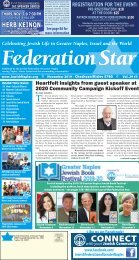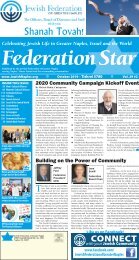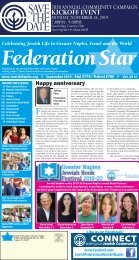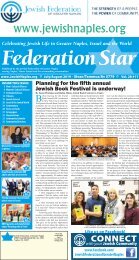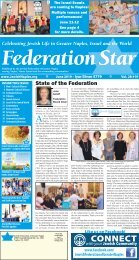Federation Star - January 2018
Create successful ePaper yourself
Turn your PDF publications into a flip-book with our unique Google optimized e-Paper software.
22A <strong>Federation</strong> <strong>Star</strong> <strong>January</strong> <strong>2018</strong><br />
Once upon a time – the Hebrew language<br />
yesterday and today<br />
Book review by Philip K. Jason, Special to the <strong>Federation</strong> <strong>Star</strong><br />
The Story of Hebrew, by Lewis<br />
Glinert. Princeton University Press.<br />
296 pages. Hardcover $27.95.<br />
Lewis Glinert, Professor of Hebrew<br />
Studies at Dartmouth College,<br />
has made a complicated<br />
and challenging story line as accessible<br />
as possible without oversimplifying<br />
the facts and the<br />
issues. His goal<br />
is well-served by<br />
choosing the word<br />
“story” rather than<br />
“history” for his<br />
title. This decision<br />
creates a<br />
mild and friendly<br />
Phil Jason<br />
kind of personification<br />
– “Hebrew”<br />
becomes a character in a lively<br />
narrative. This character is multidimensional,<br />
like any protagonist worth<br />
reading about. He (let’s say “he” for<br />
convenience) has his ups and downs.<br />
Though he’s been around for a long<br />
time, and hasn’t always aged well, he<br />
has had spectacular periods of rejuvenation.<br />
There are times, however, when<br />
his friends can hardly recognize him.<br />
Prof. Glinert, after a concise introduction,<br />
traces his character’s life in<br />
eight meaty chapters, usually offering<br />
subsections in each to help focus issues<br />
and underscore turning points. These<br />
subsections provide necessary breaks<br />
that even the most ardent followers<br />
will welcome.<br />
Early on, the author reminds us<br />
of the unique situation of Hebrew:<br />
for much of Jewish history, “Hebrew<br />
was not a mother tongue to be spoken<br />
naturally. Rather, Jews kept it alive by<br />
raising their young men to study and<br />
ponder Hebrew texts.” How could<br />
it survive without being part of an<br />
everyday exchange among members of<br />
a civilization?<br />
Among the many partial answers<br />
to that question is the recognition that<br />
the Jewish Bible had literary flexibility<br />
and richness. It contained law, stories,<br />
poetry and wisdom: tools for life and<br />
for living together. While its status as a<br />
divine gift urged attention and dependence,<br />
the text was rewarding for simply<br />
providing stimulation and pleasure.<br />
And it wasn’t all in Hebrew!<br />
Prof. Gilbert traces the ways in<br />
which Hebrew worked, or sometimes<br />
didn’t work, to maintain and sustain a<br />
population scattered and scorned. He<br />
regularly provides insights into key<br />
characteristics of the language, both<br />
its unique and shared features. These<br />
examples enliven the story, but they<br />
are subordinate to the grand discovery<br />
and appreciation of Hebrew’s journey<br />
through time.<br />
Each reader will make a personal<br />
decision about which parts of the story<br />
are most intriguing. One of these<br />
is certain to be “Jerusalem, Athens,<br />
and Rome,” notable for its vivid presentation<br />
of a long developing clash<br />
of civilizations that birthed unending<br />
consequences. Within this chapter is<br />
a sketch of Ezra, perhaps the most indispensable<br />
figure in the story of the<br />
Jewish people. It was he who “led a<br />
new wave of Jewish returnees from<br />
Babylonia” and helped to re-establish<br />
a vibrant Jewish life in Hebrew’s home<br />
territory. This “charismatic scholarpriest...<br />
orchestrated a religious revival<br />
and strove to bring the Torah to the<br />
masses.”<br />
This same chapter stresses the<br />
centrality of the Mishnah<br />
in organizing Jewish life<br />
and the planting of seeds<br />
that would, over time,<br />
grow into the standard<br />
Hebrew prayer book.<br />
The dazzling middle<br />
chapters of The<br />
Story of Hebrew balance<br />
an exploration of “The<br />
Sephardic Classical Age” against<br />
“Medieval Ashkenaz and Italy.” The<br />
first epoch, beginning around the year<br />
900 and continuing for 600 years (until<br />
the Spanish Inquisition), was a period<br />
of the highest cultural achievement.<br />
This process included “a renewal of a<br />
biblical Hebrew aesthetic and a reigning-in<br />
of the rabbinic mode.” The region<br />
of Andalusia fostered a “golden<br />
age of Hebrew poetry and linguistics.”<br />
Great minds were at work contesting<br />
the question of Hebrew language purity.<br />
What was required for the conveyance<br />
of knowledge, whether new or<br />
old? For Jonah ibn Janah, the mastery<br />
of grammatical understanding was indispensable.<br />
What version or refinement of<br />
Hebrew will best serve the Jewish<br />
imagination?<br />
The chapter on “Hebrew in the<br />
Christian Imagination” opens a world<br />
that most Jewish individuals, even the<br />
most culturally and linguistically sophisticated,<br />
rarely enter. Prof. Glinert<br />
traces the fate of Hebrew in the early<br />
stages of the Christian theological revolution<br />
and in later periods as well. He<br />
examines Christian churchmens’ need<br />
to engage Hebrew as the best way to<br />
find authority for Christian dogma.<br />
Such a mastery could also be a powerful<br />
conversion tool. The Renaissance<br />
Bradford Square Retirement Community<br />
JEWISH INTEREST<br />
O<br />
fo<br />
and Enlightenment periods<br />
in Christian Europe featured<br />
a dynamic interest in Hebrew<br />
among Christians, an<br />
interest that had waned by<br />
the early nineteenth century.<br />
By the later nineteenth<br />
century, the Zionist enterprise<br />
was in full swing, and Prof.<br />
Glinert gives the movement’s<br />
effect on Hebrew detailed, engaging attention.<br />
Similar is given to the Hasidic<br />
enterprise.<br />
The author’s treatment of the more<br />
recent periods, most importantly the<br />
connection between the founding of the<br />
modern State of Israel and the state’s<br />
commitment to Hebrew as a (essentially<br />
“the”) national language, is likely to<br />
be the chapter that will attract reading,<br />
re-reading and discussion in contemporary<br />
Jewish circles. This discussion<br />
is full of excitement and wonder about<br />
the melding of a people, a language<br />
and a homeland.<br />
Prof. Glinert provides generous<br />
chapter notes, suggestions for further<br />
reading, and a highly useful index.<br />
This book is a masterpiece that is<br />
likely to hold sway over the important<br />
and fascinating issues it discusses for<br />
many years to come. Jewish readers<br />
who enter this challenging space will<br />
find their understanding of Jewish<br />
identity mightily expanded.<br />
Philip K. Jason is Professor Emeritus<br />
of English from the United States Na-Trecval<br />
Academy. He reviews regularly forIsrae<br />
Florida Weekly, Jewish Book World, UN,<br />
Southern Literary Review, and other even<br />
19<br />
at<br />
publications. Please visit Phil’s web-origsite<br />
at www.philjason.wordpress.com. ing M<br />
in 19<br />
the o<br />
to ap<br />
with<br />
and<br />
Bradford Square<br />
It’s the little things.<br />
Throughout the years, we’ve learned the most important things in life<br />
are often the little things. Small details matter.<br />
Here at Bradford Square, we take great pride in recognizing what brings a smile to your face every day in our all-inclusive<br />
community. That means our managers live on site to help with anything you need. It means we believe in making every<br />
meal a world-class, how-you-like-it experience, and it means we hire top-quality staff who provide top-quality service.<br />
Ven<br />
who<br />
State<br />
their<br />
O<br />
dele<br />
All-Inclusive Service<br />
Call to set up your private tour today<br />
and start enjoying the little things.<br />
239-302-3826<br />
Welcome home.<br />
• Live-In Managers<br />
• Medical Alert System<br />
• Concierge Services<br />
• Professional Chefs<br />
• Full Kitchens<br />
• 24-Hour Chef Pantry<br />
• Valet Parking<br />
• Free Scheduled Transportation<br />
• Weekly Housekeeping<br />
Dining on Your Time<br />
• Room Service for Daily Meals<br />
• Fresh Chef-Prepared Meals Daily<br />
• Casual Buffet or Fine Dining<br />
...and much more!<br />
3255 Vanderbilt Beach Road • Naples, FL 34109 • BradfordSquareRetirement.com













